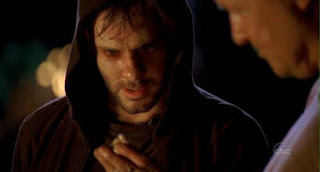I have been sitting at my computer for the last fifteen minutes trying to sum up what this pilot has meant to me, over the years. This was my first time I understood craft; I watched this pilot and realized what they were doing, why they were doing it, and I wanted to do it myself. Heck, needed to do it myself. It's also a beautifully shot pilot. The pilot not only holds up to nostalgia but helped me realize that this was as close to an ideal of a serialized beginning as you can get.
Lost is, at its heart, a fantasy; you are changing elements of a setting to explore them in a different way. Fantasy is about making things just alien enough to where you can look at the unchanged elements with fresh eyes. The Lord of the Rings is about exploring love versus power; change power to an actual dark lord with a magic ring that has addictive properties, and you have a compelling take on why love will win out. Lost is a fantasy about dealing with what's precious within you. Do you give your light wisely, do you try to push people away to protect yourself (and thus put yourself in Hell), or do you try to destroy it so you can get away? There's as many answers to that question as people, but Lost is a treatise on how you relate to yourself, and thus to others. Lost adds the Light of the Island to further clarify the theme of relationship to self and others, as well as the Man in Black to show how to not relate to that Light.
Lost is not dualistic. The Man in Black is not an anti-Light; he is an anti-Jacob, but that's not the same thing.
Every episode of this show lets us see how the subjects of the episode are going to relate to themselves and each other, and why. And the pilot is in this structure, with fine style. We learn about Jack, principally. I say principally, because this pilot accomplishes the staggering goal of introducing us to each primary character while not telling us a whole lot about them: show don't tell. Even Jack isn't explained a whole lot and we see his flashbacks! We are deliberately shown only the surface. The pilot sticks to stereotypes. Jack is the rugged hero, Kate the helpful mate, Locke and Sawyer the mysterious outsiders, Hurley and Charlie are the man-children... we could just keep going.
Everyone is archetypal. Elemental. Primal. The writers show us a preview of how the characters might interact together, without going into too much detail. They clearly know their characters well enough to be okay with putting them in situations that shows them at their most reactive, with each character running into situations that they just wouldn't do, not normally. A lot of these previews are meant to be partially deceptive; we know that Locke is sitting around because he's in shock and trying to process being able to walk again. But we're not told that. It's all surface, but the surface is so intriguing that I found myself being willing to just go along for the ride.
And then the pilot dies.
And everyone has to ask "What's out there?".
I love that it's Charlie that's asking. He's got a recovery arc ahead of him, even though we don't know it the first viewing. Out of all the characters Charlie fears the unknown most. Addiction is an answer to the unknown: going to something known, to the point of hurting yourself. But known things are just as dangerous as unknowns. The fact that Charlie asks this from left to right is going to give American viewers a tinge that this is the right question to ask. There's a deliberate discord in this shot, where Charlie is definitely not asking because he wants the answer. But he's shot in a way where we want to know.
It's a brilliant shot.
And it's a brilliant pilot. Because it tells just enough, while showing that we don't know anything. And then making us want to know more. Question after question is poured out, along with excitement and intrigue. And then it ends the episode with a literal question to a problem that there is absolutely no context for.
This pilot is as good as it gets. What a freaking amazing show.


No comments:
Post a Comment